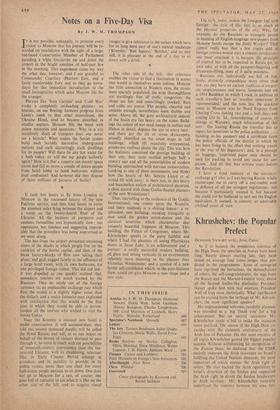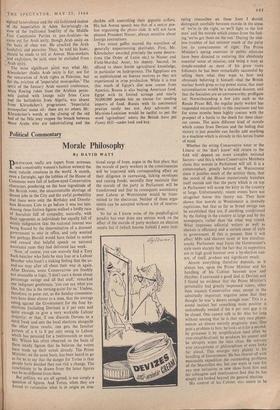Khrushchev: the Popular Prefect
DISMOND S FEW ART writes front Cairo: As if to balance the ponderous statistics of the High Dam, the speeches in Aswan have been long. Nearly always starting late, they have lasted on average four times longer than pre- dicted in the programmes. Acres of newsprint have reprinted the hortations, the denunciations of others, the self-congratulations, the tags from the Koran and the Marxist-Leninist texts, above all the Samuel Smiles-like platitudes. President Nasser spoke best with real emotion, President Aref of Iraq most rhetorically. What significance can be excised from the verbiage of Mr. Khrush- chev, the most significant speaker?
His unprecedented welcome, carefully planned, was intended as a big 'thank you' for a big achievement. But on several occasions Mr. Khrushchev made a bid to make the occasion more political. The season of the High Dam co- incides with the sixteenth anniversary of the Arab loss of Palestine. On this most emotive of all topics Khrushchev gained ffie biggest popular success. Without withdrawing his recognition of the Zionist State, he declared that the USSR entirely endorses the Arab insistence on Israel's fulfilling the United Nations demands, the most important of which stresses the Arab right of return. He also backed the Arab opposition to Israel's diversion of the Jordan and supported the Arab right to divert the Jordan headwaters in Arab territory: Mr. Khrushchev naturally underlined the contrast between his own far-
sighted benevolence and the old-fashioned malice of the Imperialists in Aden. Surprisingly—in view of the traditional hostility of the Middle East Communist Parties to pan-Arabism—he came out for Arab unity, though Arab unity on the basis of class war. He attacked the Arab feudalists and parasites. They, he told his hosts, should be made to toil at Aswan. Non-workers and exploiters, he said, must be excluded from Arab unity.
The most significant point was what Mr. Khrushchev thinks Arab unity is for; not for the restoration of Arab rights in Palestine, but for the eviction of 'imperialist monopolies.' The spirit of the January Arab summit conference, When flowing robes from the Arabian penin- sula jostled with lounge suits from Cairo and the battledress from Algeria, was absent from Khrushchev's programme. 'Imperialist monopolies' mean oil: there are no others. Mr. Khrushchev's words at the closing of the old bed of the Nile may reopen the breach between those Arabs who are industrialising and the sheikhs still controlling their gigantic coffers. His last Aswan speech was that of a senior pre- fect organising the photo club. It will not have pleased President Nasser, always sensitive about foreign instructions.
Two minor gaffes marred the marathon of generally unpatronising platitudes. First, Mr. Khrushchev awarded precisely the same decora- tions (the Order of Lenin etc.) to Nasser and Field-Marshal Amer, his deputy. Second, he offered to share Soviet agricultural knowledge, in particular on hydroponics. The Egyptians are as sophisticated on human motives as they are experienced in crop production. While it is true that much of Egypt's diet now comes from America, Russia is also buying American food. Egypt with its limited acreage and nearly 30,000,000 people has an excuse for needing imports of food. Russia with its continental prairies surely has not. Any advocate of Marxism-Leninism would be tactful to 'put the word 'agriculture' where the British have put Fanny Hill—under lock and key.



































 Previous page
Previous page